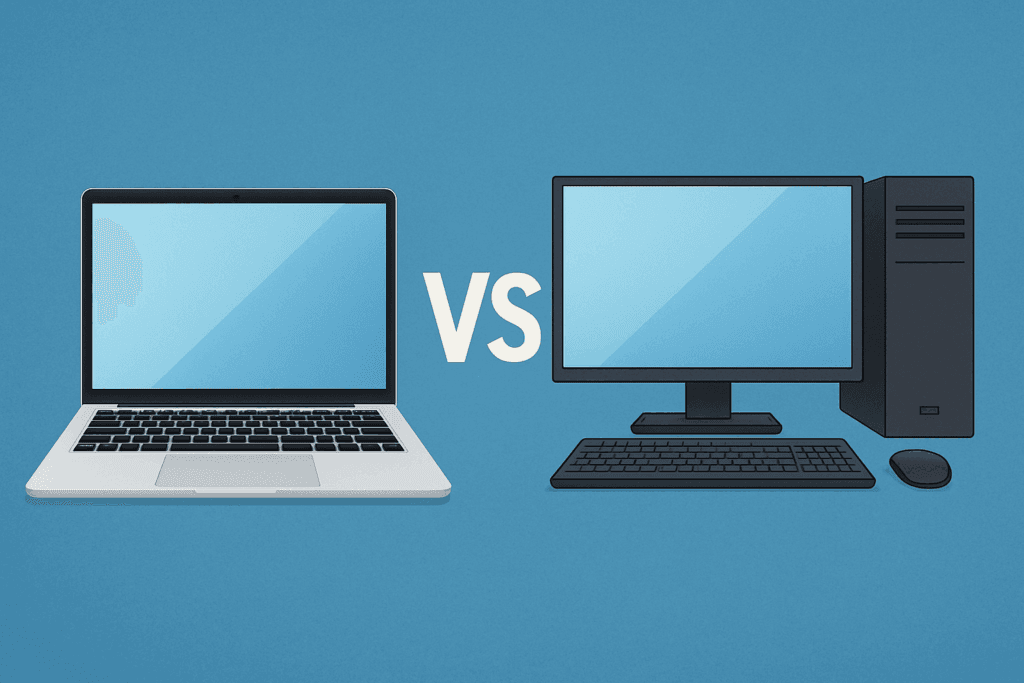Choosing between a laptop and a desktop computer isn’t as simple as it used to be. The Laptop vs. Desktop decision now involves more nuanced factors, with modern laptops becoming increasingly powerful and desktops offering compact, customizable options. Whether you're a student, gamer, remote worker, or casual user, understanding the trade-offs in the Laptop vs. Desktop comparison is key to making the right choice.
In this article, we’ll break down the key differences between laptops and desktops and help you determine which option best fits your needs—whether for work, gaming, school, or general use.

Portability: Laptop Wins
If you’re constantly on the move, portability is likely a top concern. Laptops are designed for mobility—lightweight, compact, and with built-in screens and keyboards. Whether you're working from a café, studying on campus, or traveling, a laptop lets you take your work (or play) anywhere.
Desktops, on the other hand, are stationary. Even the smaller ones require a monitor, keyboard, mouse, and power outlet, making them ideal for a permanent workspace.
Performance and Power: Desktop Takes the Lead
When it comes to raw performance, desktops still have the edge. They typically offer more powerful CPUs and GPUs for the same price, better cooling systems, and easier upgrades. This makes them a favorite for gamers, video editors, developers, and power users.
That said, high-end laptops are closing the gap, especially for those willing to invest a bit more. Some modern laptops can even handle tasks like video rendering or running AAA games—but usually at a higher cost.
Upgrade Options: Desktops Are More Flexible
When considering Laptop vs. Desktop, upgrade potential is one of the biggest differentiators. Desktops are built with customization in mind. Users can easily replace or enhance components such as RAM, graphics cards, storage drives, and even the CPU. This means a desktop can evolve over time, adapting to new software demands or personal performance needs without replacing the entire system.
In the Laptop vs. Desktop debate, laptops fall short in this area. Most laptops have limited upgrade options—typically allowing only memory or storage upgrades, and even those are sometimes soldered to the motherboard in slimmer models. This lack of flexibility can shorten the useful lifespan of a laptop, especially for users with growing performance requirements.
The ability to upgrade a desktop extends its longevity and can save money in the long run. In contrast, when a laptop’s performance begins to lag, users often have no choice but to invest in a new device. For anyone weighing Laptop vs. Desktop with an eye on long-term value and adaptability, desktops clearly lead the pack.
Screen Size and Comfort: Desktop Offers More
Comfort is another major consideration in the Laptop vs. Desktop comparison, especially for those spending extended hours in front of a screen. Desktops offer greater ergonomic flexibility—you can choose large or dual monitors, full-sized mechanical keyboards, adjustable chairs, and monitor arms to create an optimized workstation tailored to your posture and preferences.
In the Laptop vs. Desktop discussion, laptops win on portability but often lose on comfort. While it’s possible to connect external displays and accessories to a laptop, doing so adds bulk and cost, potentially negating the device’s key advantage—mobility. And for many users, the built-in keyboard and smaller screen of a laptop just aren't ideal for prolonged use.
For professionals, gamers, and creatives who prioritize screen space and comfort over mobility, the Laptop vs. Desktop decision tilts heavily in favor of desktops. The freedom to configure a highly comfortable and efficient setup makes desktops the better choice for stationary work environments.
Ultimately, if comfort, customization, and long hours at a workstation are top priorities, Laptop vs. Desktop evaluations will consistently favor desktops over their more portable counterparts.
Gaming Experience: Desktop Wins Again
While many gaming laptops offer solid performance, desktops are the gold standard for PC gaming. They offer higher frame rates, better graphics, and more upgrade potential. Plus, desktop GPUs often outperform their laptop counterparts even when the specs look similar.
If you enjoy playing online games like shooters, strategy titles, or even online casino games, a desktop can offer a smoother and more immersive experience.
For example, if you're a fan of online blackjack or live dealer games, you can explore platforms like https://www.stellarspins.fun/en/online-blackjack , where speed and display clarity make a big difference. A desktop setup can give you that extra edge when playing in real-time environments.
Price and Value: It Depends
Laptops offer great value if you need portability and an all-in-one solution. You’re paying for the convenience of mobility, battery power, and compact design.
Desktops, however, often deliver better performance for the same price—and they’re easier to repair or upgrade over time.
So, if you need a computer for light tasks and portability, a mid-range laptop might be the better investment. But if performance, long-term value, and upgrade potential are more important, go with a desktop.
Choose Based on Your Lifestyle
There’s no one-size-fits-all answer. Here’s a quick summary to help guide your decision:
| Category | Best Option |
|---|---|
| Portability | Laptop |
| Performance | Desktop |
| Upgradability | Desktop |
| Comfort/Ergonomics | Desktop |
| Gaming | Desktop |
| Budget Flexibility | Tie (depends on needs) |
Choose a laptop if you:
- Work remotely or travel often
- Need a compact, all-in-one device
- Don’t plan to upgrade parts frequently
Choose a desktop if you:
- Want high performance and value
- Play games or use demanding software
- Prefer a more comfortable, ergonomic setup






